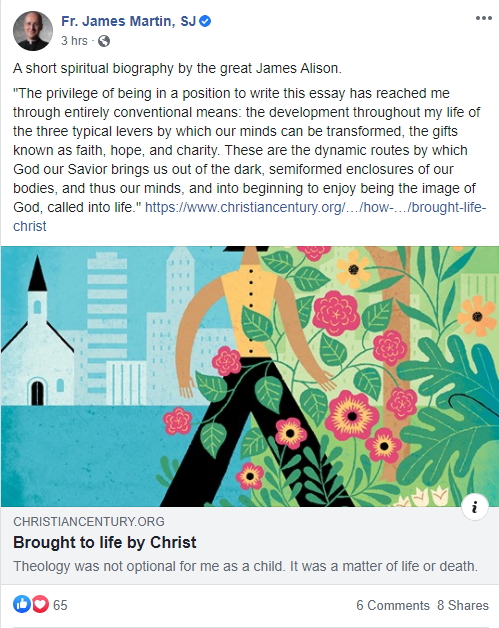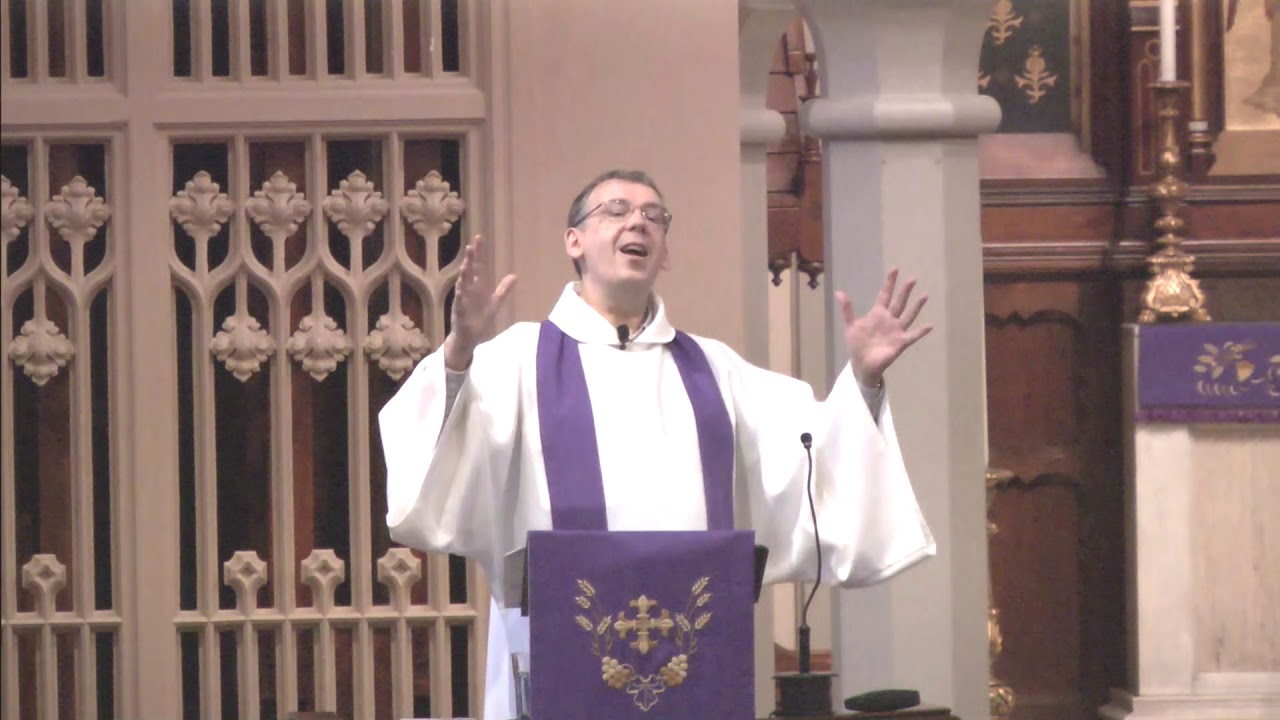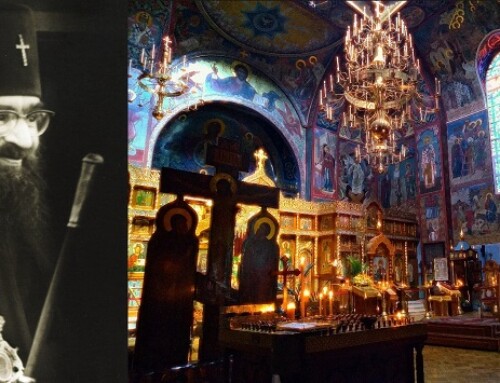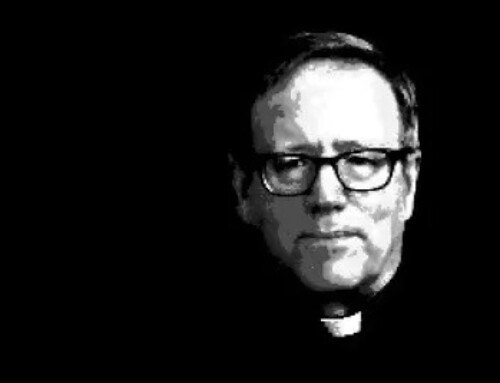In a recent essay, “Brought to Life by Christ,” primarily about his struggles with homosexuality as a Dominican priest, James Alison wrote:
All this time I was still wrestling with being gay. Not that this was a problem for the English Dominicans. They had been dealing with the issue with relative openness since the 1920s, had acquired a certain notoriety in the mid-1970s, and their members, whether themselves straight or gay, continued throughout the 35 years of backlash that began with John Paul II to be as grown-up and sensible as was possible in the church of the period. Indeed, my friend Timothy Radcliffe, as master of the Dominican order and subsequently as a writer and lecturer, was a rare beacon of light in dark times, just as he continues to be in Francis’s far less fraught pontificate.
Timothy Radcliffe is an English Dominican with a long history of making gay-affirmative statements; in 2013, discussing same-sex relationships, he said:
“Certainly it can be generous, vulnerable, tender, mutual and non-violent. So in many ways, I would think that it can be expressive of Christ’s self-gift.”
In a post dated August 8, 2018, on the website of the dissident Association of Catholic Priests, (originally published in “The Tablet” on 1 Aug. 18) Alison described, what he called the “clerical closet” in the Roman Catholic Church; he stated:
…a few years ago, I found myself leading a retreat for Italian gay priests in Rome. Of the nearly 50 participants some were single, some partnered…Among them there were seven or eight mid-level Vatican officials.
Ordained with the Dominicans in 1978, James Alison now describes himself “as a Catholic priest and theologian who is also gay.” In a 2012 interview, he said: “My current canonical status is anomalous. I am a validly ordained priest in good standing, with no penalties or disciplinary matters hanging over me. Although it is many years since I have been associated with the Dominicans, I have not been laicized.” Alison has been openly critical in both his published works, as well as in interviews and lectures, concerning the Church’s teachings on homosexuality. For the most part, his contention is that “gay” men and women are created gay by God, thus the homosexual inclination is not “intrinsically disordered,” and that the Catholic Church’s teachings on the issue will eventually change.
Although Alison was already ordained to the priesthood, regarding the AIDS crisis, in “Brought to Life by Christ,” he wrote:
In retrospect, had I not spent the years 1981–1995 with the Dominicans, and thus with very little sexual activity indeed, I would no more be alive now than are my first boyfriend, our friends, and much of the rest of my generation of gay men.
Jesuit James Martin, Tweeting about Alison’s recent essay, described him as “the great James Alison.”
Quotes from James Alison:
My disagreement with the current teaching of the Roman Congregations is about what I consider to be their fundamentally flawed premise of the objectively disordered nature of the inclination.
…the Church can, without any damage to its divine doctrine and mission, change its characterization of gay and lesbian people, and, changing its characterization, change also its position with relation to the civil laws which normalize the lives of such people.
…the Church cannot say of the homosexual inclination that it is a desire which is in itself intrinsically evil, since to say this would be to fall into the heresy of claiming that there is some part of being human which is essentially depraved.
It means noting with joy that we are now closer than ever to being able to imagine that a rejoicing gay heart and a rejoicing Catholic heart can be the same heart, and a normal, and healthy and holy thing. We can imagine a seminar reading Brokeback Mountain in the light of Deus Caritas Est or vice versa… (See: “The Gays and Grays: The Story of the Gay Community at Most Holy Redeemer Catholic Parish” by Donal Godfrey, S.J.)
The same one who creates us redeems us. And he hasn’t redeemed us by despising that which he created, but by making it much more perfect. The moment this becomes clear or accepted, that what we call being “gay” or being “lesbian” is not any sort of pathology, either psychological or physiological, but what I refer to as a regularly occurring non-pathological minority variant in the human condition, whether Church authority likes it or not, the teaching will change and has changed. Because the teaching that stays the same is the teaching about grace. So the question isn’t, “must the Church change its teachings?” but given that we have been shown something new, “how will the Church adapt and face up to this new truth?”
Given the existence, present and future, of committed, long term, partnerships recognised by civil law between adults of the same-sex who happen to be baptised, what should we call these? To what forms of flourishing can they contribute? What might their relationship be to the creation of forms of hospitality to the vulnerable, whether children or other precarious people? Please remember that in the classic understanding of marriage, it is the fact that the two partners are baptised which is what gives the marriage its sacramentality. They are living out a secular reality, marriage, in a way which is elevated by the fact that each is acting out the role of Christ loving his Church by giving his life, even unto death, for the other.
What is certainly true is that no purpose at all is served by seeing these realities as in principle in rivalry with each other, as though same-sex marriage somehow cheapens opposite-sex marriage. Likewise, should it indeed turn out that marriage between two baptized persons of the same sex is not sacramental in exactly the same sense as opposite-sex marriage, then whatever form of sacramentality does turn out to be proper to same-sex couples would certainly not be “second best” to the sacrament of marriage. God’s summons to flourishing involves people being called in tailor-made ways, not forced to endure invidious comparisons. There are many mansions in God’s house, and he invites each of us to discover what is his plan for each one of us—we are called by name, not by category.
Most of the theories espoused by Alison have been incorporated into several Catholic LGBT ministries. For example, on December 15, 2016, Alison spoke at St. Paul the Apostle Catholic Church in New York City; the parish is the home to the gay-affirmative ministry “Out at St. Paul.” In the film project “Owning Our Faith,” which was sponsored by St. Paul the Apostle Church and the Paulist Fathers, several members of the “ministry” are interviewed. Here is an excerpt from the documentary:
I think what’s interesting is that the Catholic Church probably thinks that it is accepting of gay people, because its message is ‘gay people exist and we should love them and not discriminate against them. But because the Church also tells gay people essentially that they need to be celibate, what the Church is saying is ‘you cannot live fully. You can be gay but you can’t live that life.’ And so that inherently is discriminatory.







Sin is sin is sin. There is no redefining or subverting that fact. Try they will to change anything and everything to contort this truth to their specifications and evils. My questions is what do we the laity do to prevent this destruction of the Catholic faith? God bless you and thank you for your insight.
All the gay-affirmative clerics and laity are Ape Church. The Catholic Church is to be found only in oases, scattered over the Earth. When looking for the Catholic Church, eliminate all those who celebrate the Novus Ordo. Then, even among those who remain, scrutinize carefully and patiently for orthodoxy and holiness.
I have a difficult time understanding how this guy managed to get beyond first year logic class with a passing grade. He never should have been ordained but then that reflects on the screening and formation practices of OP, which I am sure they would rather not have exposed to public scrutiny.